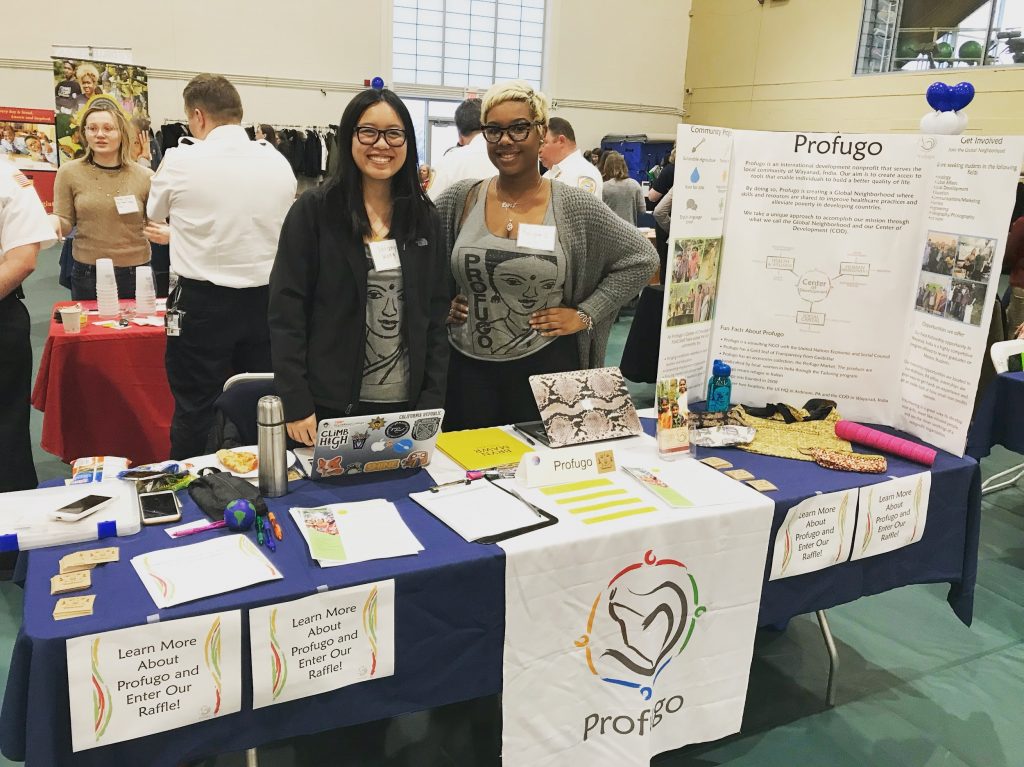Last week, a fellow intern and I went to Bryn Mawr College’s campus for a Nonprofit Career Fair.

Interns Tiffany and Raigan at Bryn Mawr College’s Nonprofit Career Fair
It was a great experience, and we managed to garner a lot of attention for the organization. One of the means we used to do so was a raffle. We had students who came to our table answer a question to get the chance to win one of Profugo’s products. The question was:
“What do you plan to do this week to be a good neighbor?”
All of the answers we got were based on the idea of doing something simple and small to brighten someone else’s day. One student said, “I will pay it forward and do the ‘small’ things, telling people good morning, having meaningful conversations, anything to make someone smile.”, emphasizing how a small but kind action can make someone’s day. Other students had similar philosophies, and many would do these small actions for people they didn’t even know. Answers ranged from baking a cake for a close friend, to spraying air freshener in an apartment complex for a floor of strangers. Yet, what connects all of these answers is the idea of the “neighbor”.
It is interesting to see what people think of when they see the word “neighbor”. Some of the students took it more literally, and said they would do a small action for someone living close to them or on their dorm floor. This “someone” didn’t even have to be human—a student said they would refill their bird feeder and feed squirrels peanuts! Others said they would “check in with people” and smile and say hi to people in general. In the latter case, the students are associating the college campus with the idea of a “neighborhood”. Lastly, some students would refer to a close friend as a neighbor. It is interesting to see that people don’t automatically assume that neighbor means someone living right next to them—it could be anyone that they’re close with or feel associated with, regardless of physical proximity.
All of these answers remind me of some discussions I’ve had in my sociology classes. As a sociology major, I understand the importance of a community and how it impacts an individual. A famous sociologist, Herbert Mead, expands on this. He believed that a person was who they were because of their community, and that in this community we have primary groups—people we are traditionally very close with and grow up with. Families are usually the first thing that pops into people’s’ minds when thinking about such groups, but this can also include close friend groups— as well as neighbors.
Sociologists have pointed out though, that our idea of “neighbor” now has expanded beyond just those living near us, because we can now easily make connections with people that live outside of our neighborhoods. Thus, who we include in our primary groups for individual development has changed as well. What the students said in their raffles thus reflected this notion, and it gives hope to us here at Profugo for our mission to create a global neighborhood. When we say “global neighborhood”, we are obviously not saying everyone in the world should move close to each other and become literal neighbors. Instead, we are asking that everyone act as if we all did live close to each other and share communal experiences—like people in a primary group would.
It is this willingness to include others beyond just those who live physically close to you and to think of them as “neighbors” that makes the possibility of creating and instilling such a way of thinking in people more possible. The students who answered our raffles all displayed a willingness to think beyond just the literal definition of a neighbor, and showed an openness to include friends and acquaintances into their idea of a “neighbor”. Our field fellows and staff in Wayanad right now are also actively practicing a social awareness that requires them to think about a global neighborhood and take steps in furthering such a concept. Small actions such as being there for the students of the English school, walking among the town people, and actively being involved in Profugo’s various programs all contribute to a goal of a global neighborhood. Profugo thus understands the importance of the little actions, and realizes their impact not only on individual happiness, but also at the community level. We also understand the importance of forming deep and close connections, hence our involvement in the field. When working in Wayanad then, we want to be more than just a visitor—we want to be a part of the neighborhood! It is through this that we hope to galvanize a movement to create a global neighborhood.

Leave a Reply
You must be logged in to post a comment.